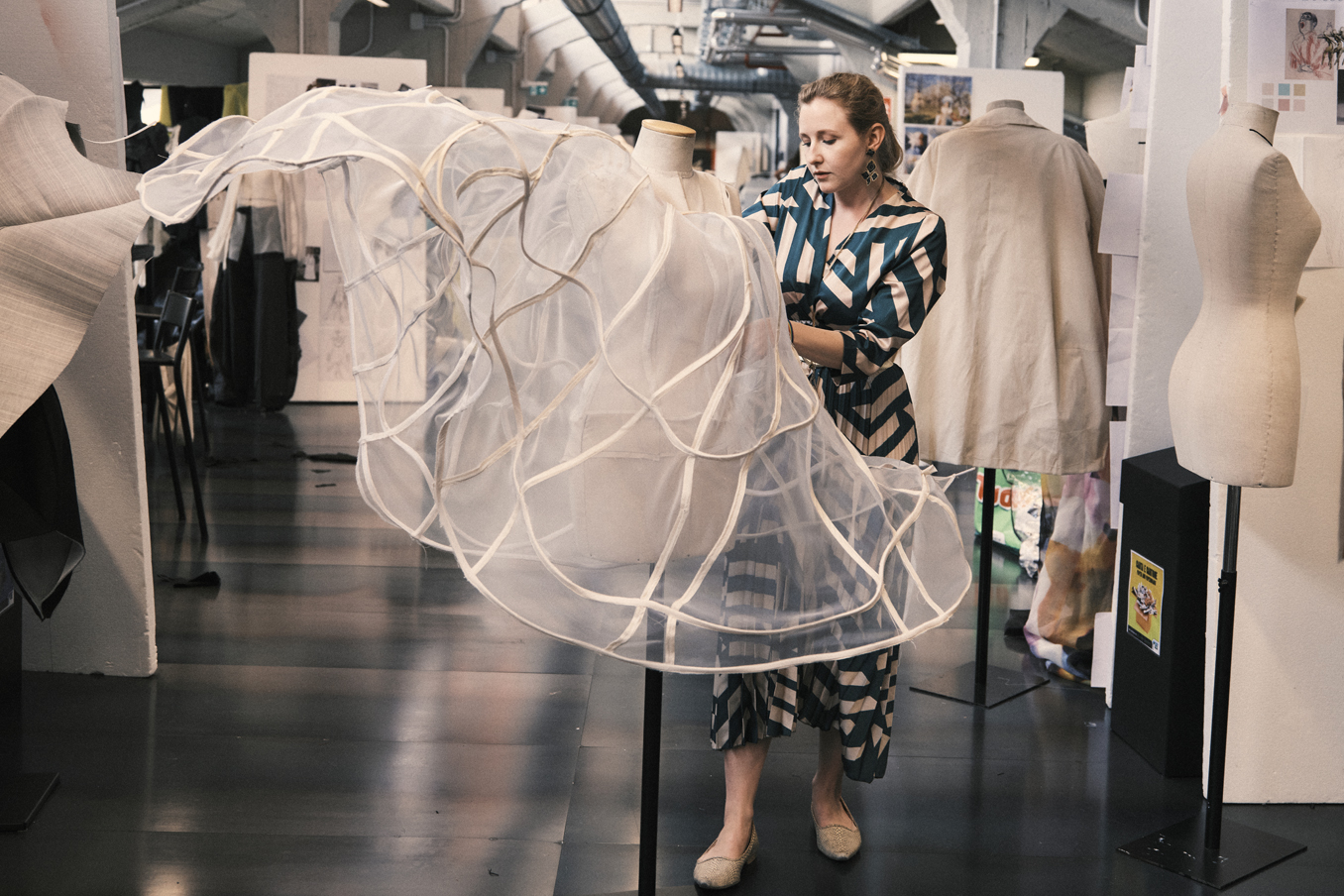Overview
The Undergraduate in Event Management breaks new ground in entertainment education by merging creative experience design with technical expertise and business acumen. This innovative program takes a comprehensive approach to provide students with a thorough understanding of event management and production across the entertainment and fashion industries. Students develop skills in event planning, production management, creative direction, and business strategy while maintaining a sharp focus on the evolving landscape of experiential entertainment.
Through the integration of industry-driven methodologies and creative thinking, we cultivate visionary event managers who can seamlessly navigate both the artistic and commercial aspects of the entertainment industry. The course focuses on imparting comprehensive knowledge of event management, technical production skills, business fundamentals, and critical understanding of entertainment industry contexts in order to drive the global creative economy. The intellectual and personal development of students are encouraged by embracing critical questioning, and an ethos of innovation.
Polimoda strives to create graduates with an entrepreneurial mindset, capable of striking the perfect balance between creative innovation and professional execution. Polimoda strives to develop the students’ strong professional identity with creative and managerial skills showcased through a portfolio. The school nurtures a strong internal network in which our students can build relationships between different courses such as fashion art direction, fashion styling and fashion design, developing cross discipline knowledge and ensuring a long lasting network of young talents.
Our goal is to equip students with the tools to not just participate in, but to innovatively shape and redefine how audiences experience entertainment and fashion events.
Highlights
This course covers the spectrum of event management and production in the entertainment and fashion industry. From fashion, music and cinema to film and sports, the course provides theoretical knowledge, creative and technical skills across different sectors of the entertainment industry.
- Explore entertainment and fashion industry dynamics
- Understand contemporary event management and production
- Learn technical skills in event planning and execution
- Develop a critical understanding of audience engagement
- Master event planning and production techniques
- Learn advanced budgeting and financial management
- Develop expertise in marketing and promotion
- Create professional portfolios and business strategies
- Develop creative concept development skills
- Learn venue and space management
- Create immersive event experiences
- Explore cross-disciplinary collaboration
- Projects in collaboration with industry active companies
- Realizing experiences and events, in-house and on location
- Personal portfolio focus
- 6 in-house professional photo studios at the Manifattura Campus
- All necessary equipment for students to work on individual or group projects
- Access to computer and editing equipment
- Access to unprecedented in Europe Fashion Library for visual research
Learning method
The course includes diverse learning methods such as:
- Lectures and workshops conducted by experienced teachers with tangible industry experience
- Guest lectures with external industry professionals
- Field trips to gain industry insights and mirror actual professional fashion environments
- Industry projects with companies
- Individual and group projects
- Critical self and peer appraisal
- Independent study
- Internship at the end of the third year
Assessment method
- Presentations of the students work
- Midterms and final exams
- A mandatory final project
Course Structure
Over the three years, group and individual projects are organized, incorporating creative and technical skills. Each project is presented to faculty and peers to encourage intellectual and personal development by embracing critical questioning, and critical self and peer appraisal.
Year 1
- Research Methodology
- Sociology of the Imaginary
- Introduction to Entertainment Industry
- Entertainment System
- The Art World and Its Role in the Entertainment Industry
- Event Planning and Production
- Art Direction
- Consumer Behavior
- Marketing and Promotion
- Quantitative Business Methods
- Public Relations and Communications
- Financial Management
- Legal Aspects
- Graphic Design
- Media
- Digital Planning Tools
Year 2
- Music
- Cinema and Film
- Sport
- Event Planning and Production 2
- Venue and Space Management
- Digital Marketing and Analytics
- Global Entertainment Markets and Business Strategy
- Event Production for Fashion Retail
- Graphic Design
- Sound Design
- Event Technology and Lighting
- Contemporary Fashion
- Fashion Show Production
- Fashion Performance
- Talent Management
- Casting
Career Orientation
Year 3
- Ethics and Social Responsibility in Entertainment
- Branding and Sponsorship
- Entrepreneurship
- Financial Management in Entertainment 2
- Legal Aspects of Entertainment 2
- Public Speaking
- Graphic Design
- Final Project
- Career Orientation 2
Careers
Based on individual character and acquired skills, you can become:
An Event Manager oversees the planning, execution, and overall management of events. They ensure events meet client goals and expectations while managing budgets, teams, and timelines. They are responsible for creating comprehensive event strategies and maintaining relationships with key stakeholders.
An Event Producer manages the creative and logistical aspects of events. They develop concepts, oversee production elements, and ensure high-quality execution. The role requires strong creative vision combined with practical problem-solving skills and technical knowledge.
An entertainment industry professional who oversees marketing strategies to enhance consumer engagement for live events and experiences. They develop integrated campaigns for concerts, festivals, fashion shows, and cultural events, managing social media presence, ticket sales strategies, and promotional partnerships while measuring audience engagement and campaign performance across platforms.
Brand Strategists develop distinctive brand identities by analyzing market trends and consumer behaviors. They craft cohesive messaging across all touchpoints, including events, ensuring brand experiences authentically reflect client values. They balance creativity with analytics to create meaningful connections between brands and audiences, transforming events into powerful brand-building opportunities.
A specialized professional who oversees event spaces ranging from concert halls to fashion show venues. They manage the technical, logistical, and operational aspects of live event spaces, coordinate with production teams, ensure safety protocols, and optimize venue capabilities for different event types while maintaining client relationships and profitability.
A Sponsorship Manager develops and maintains relationships with event sponsors. They create sponsorship packages, negotiate agreements, and ensure sponsor visibility and ROI. The role requires strong business acumen and relationship management skills.
Public Relations managers in events create compelling narratives around experiences, securing media coverage and influencer participation. They craft press releases, coordinate events to generate positive exposure, manage stakeholder communications, and mitigate potential controversies. They transform occasions into newsworthy moments through strategic press relationships, crafting stories that elevate client brands while measuring and reporting audience engagement impact.
A Fashion Communications Manager orchestrates brand narratives during runway shows, product launches, and industry events. They coordinate with designers, stylists, and media to showcase collections through strategic storytelling. They manage press access, develop content strategies for digital amplification, and ensure events communicate brands authentically. They translate fashion concepts into immersive experiences that resonate with influencers, buyers, and consumers.
Career services
The Career and Company Relations Office supports all students by creating a connection with the working world. Our customized career services like CV help, career days, individual interviews and internship proposals help students access the job market.
The course is completed with an internship in a fashion company at the end of the third year.
The course has a great relationship with the international fashion community, providing many intern opportunities from a wide range of sources. Our graduates are successful across the fashion industry.
Facilities
Polimoda hosts a range of world class facilities such as state of the art computer labs equipped with an array of 3D modeling and graphic programs, study areas for communal and independent study, two lecture halls, academic services, large professional workshops, photo studios, and café.
Students have access to:
- 6 in-house professional photo studios at the Manifattura Campus
- All necessary equipment for students to work on individual or group projects
- Access to computer and editing equipment
- Access to one of Europe’s largest Fashion Libraries for visual research
- Study areas and lecture halls
Over its two sites, Polimoda exceeds 15,000 square meters of fashion education spaces, capable of accommodating over 2,000 students. The two campuses at Manifattura Tabacchi and Villa Favard, located a short distance from each other, form a single base for fashion education.
Villa Campus
Villa Campus, housed in the historic Villa Favard, serves as Polimoda’s headquarters and heart of fashion business education. Home to programs in marketing, communication, merchandising, retail, product management, and sustainable fashion, this elegant setting combines educational excellence with essential student services. From student orientation to career development, corporate relations to academic support, Villa Campus nurtures both professional growth and creative dialogue in a historic setting that bridges fashion’s past and future.
Beyond academics, Villa Favard stands as Florence’s premier fashion culture destination. The campus hosts international industry leaders and cultural events, creating a dynamic space where fashion education meets real-world experience.
Manifattura Campus
Manifattura Campus redefines the standards of fashion education: modern and multifunctional spaces host classrooms and technologically advanced workshops designed to faithfully reflect the industry’s environment and equipment. Spanning over 10,000 square meters, the campus includes facilities that are ideal for art direction and business students: six photography studios of various sizes, theoretical classrooms, drawing spaces and computer labs with cutting-edge design and publishing software.
Photo Studios
Manifattura campus includes six photography studios of various sizes. This is where photoshoot, videos and interviews are all carried out for academic and commercial outcomes. These photo studios are available to all students either through organized classes and lessons or through individual booking for student projects.
Library
The extensive library resources are available to all students to help them study around their subjects with publications on contemporary fashion, arts, sociology, and culture, providing a rich context for their studies.
Polimoda’s library is one of the largest fashion libraries in Europe. Located in Florence’s Villa Favard, Centro di Documentazione Matteo Lanzoni – Polimoda Library holds an extensive collection of fashion publications.
Since its establishment in 1986, the Polimoda Library has grown to become a hub of fashion knowledge. With over 29,000 volumes, including books on fashion history, design, textile technology, marketing, and economics, it caters to diverse interests. The library also features an array of fashion magazines, look-books, film resources and online materials. It is also a place for quiet, independent study.
Requirements
Basic requirements to apply:
- Curriculum Vitae (CV) with motivation letter
- English language proficiency
- Secondary school (high school) diploma or equivalent

